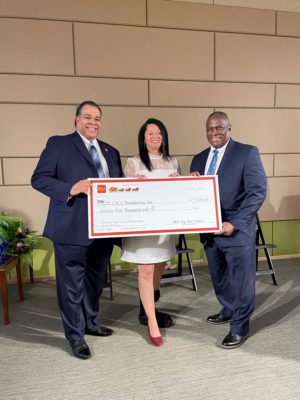Wells Fargo has given the Connecticut State Colleges & University (CCSU) Foundation a $75,000 grant to support equity-based programs and services at Gateway, Norwalk, and Housatonic Community Colleges.
These programs are aimed at improving educational outcomes among students who are facing material hardships. Each addresses a different group of students, but all have a record of success in improving student outcomes which has helped establish them as worthwhile.
Gateway Community College in New Haven offers the Equity in Education Fund focused on providing students with the resources and support they need at the start of their academic career to ensure long-term success. Norwalk Community College’s UPLIFT program is focused on narrowing the equity gap for men of color.

The Family Economic Security Program (FESP) at Housatonic Community College in Bridgeport is centered on providing women caring for dependents with aid for completing their studies while taking care of others. Casey Cruz, a Housatonic student in the program called it vital for her to return to school.
“Without the program I’d definitely be struggling,” Cruz said. “I would probably be a lot more stressed out than I am.”
Cruz grew up in New York City, the second eldest of four daughters. They were raised by her father, who still works for the MTA, and her visually impaired mother. At 18 she was enrolled at CUNY Hunter but opted to start her career right away.
Cruz worked at Delta Airlines for 10 years but lost her job at the start of the pandemic. She moved to Bridgeport with her husband so their son could attend better schools once he reached kindergarten age, but those plans were also thrown into disarray by the pandemic.
“As a parent you’re always putting your kid first, asking are you doing enough for your kid?” She explained that that was just the first in a series of questions that used to haunt her. “There’s always an insecurity as a parent. Am I going to be able to keep the roof over their head? Am I going to have to get them to school? And am I going to be able to feed them?”
While Cruz counted herself fortunate to have not needed immediate answers to those questions, partnering with an FESP coach and meeting other students in the program helped her realize there were people she could consult and be able to help her find solutions that would keep her education moving forward.
Dr. Thomas Coley, regional president for CSCU’s Shoreline West Region, indicated that students like Cruz illustrated why equity-based programs are so important.
“What we find is that it doesn’t take much to discourage continuing education or pursuing a credential, particularly with the pandemic because so many of our students are front-line workers,” Coley said. “They’re providing childcare, but they still need to work. The FESP program not only gives them the resources but also a coaching component and provides social support so that they’re not in it alone. We want to give them everything they need to be successful.”
Wells Fargo Vice President and Community Relations Consultant Terence Floyd stated that supporting equity-based programs in community colleges was a “no-brainer,” particularly at this point in time.
“Life is tough in general,” he explained. “Now you throw a worldwide pandemic on top of everything while we’re asking these young adults who have a variety of challenges to go out there and better themselves.”






















